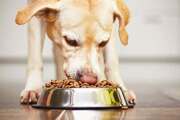 What is the problem with Grain-Free diets? There has been a lot in the media as of late concerning grain-free diets causing heart disease. In June 2019, the FDA released a report of dogs with DCM (Dilated Cardiomyopathy). This primary disease causes the stretching of the heart muscle where the chambers are enlarged, causing the heart to not be able to pump as efficiently as it should. There are two breeds that typically develop this condition – Cocker Spaniels and Dobermans. However, what had alerted the FDA that there was a problem is the increase in cases in breeds that typically do not develop this type of heart condition. But there are some questions that need to be addressed before we delve into this whole controversy. Why was grain-free food considered better? Why is it even an option? There are three main answers to this question.
What is Dilated Cardiomyopathy and how is it related to diet? The following is a description of cardiomyopathy from Cornell College of Veterinary Medicine. “Canine dilated cardiomyopathy (DCM) is a primary disease of cardiac muscle that results in a decreased ability of the heart to generate pressure to pump blood through the vascular system. The definitive cause of canine DCM is the subject of debate, although several factors including nutritional, infectious, and genetic predisposition have been implicated. DCM is characterized by dilation of the ventricles with ventricular wall thinning. In many cases, dilation of all four chambers of the heart is seen The ability of the heart to serve as a pump is diminished, and clinical signs of DCM occur secondary to either decreased delivery of oxygenated blood to the body (lethargy, weakness, weight loss, collapse), or to congestion of the blood in the lungs (coughing, increased respiratory rate and/or effort, abdominal distention) or both. Cardiac dilation, decreased oxygen supply, and increased oxygen demand secondary to elevated heart rate and ventricular wall stress may predispose to the development of cardiac arrhythmias arising in either the atria (atrial fibrillation, supraventricular tachycardia) or in the ventricles (ventricular premature complexes, ventricular tachycardia). Arrhythmias may predispose affected dogs to sudden death.” In, Doberman Pinscher, Great Dane, Boxer, and Cocker Spaniel a dietary carnitine deficiency may play a role in some cases of Boxer DCM, and taurine responsive DCM has been identified in Cocker Spaniels. As far as the nutritional aspect – Dilated Cardiomyopathy can be caused or exacerbated by a lack of carnitine in dogs and taurine in cats. In the 1980’s there were a high number of cases of DCM in cats. It was determined that there was not a high enough level of taurine which is an essential amino acid for cats. Since the issue has been addressed it is uncommon to see dilated cardiomyopathy in cats, that is related IF they are fed a balanced commercial diet. So, what exactly is the reason for grain-free diets causing DCM? In short, we don’t really know. But the theory I have, as well as several respected veterinary nutritionists is grain-free diets in and of themselves are not bad. The issue appears to be the ratio of meat and legumes (chickpeas, peas, lentils, etc.) Taurine and Carnitine only come from meat protein. Unfortunately, you can’t just look at the guarantee analysis on the bag for protein and tell that there is a certain amino acid analysis or deficiencies. Nor can you effectively compare ingredients to 2 similar bags of food and determine if there are too many legumes. As the labels are listed now, you know the largest ingredient by weight is the first listed, then the second and so on. What you cannot tell is the percentage of each ingredient in the food. So, one bag may be fine and not cause issues but the other will. But what is also not being mentioned in the media is that other foods with exotic meat proteins have been implicated. Such as kangaroo, alligator, etc. The theory that each type of meat has a different amino acid profile. Kangaroo meat is not the same as beef, chicken, etc. When each are analyzed to the amino acid level, each meat will have different amino acid profile. Therefore, ALL creatures should eat a varied diet that is in their diet profile. So, what do I feed my pet in the meantime? Do I stay away from grain-free foods? My general recommendation is to mix things up. Unless your pet has a known food allergy, don’t feed just grain-free food all the time. Change the formulas from grain and grain-free diets, as well as different meat ingredients. Switch formulas with a different meat protein, while sticking with common meats. Change between chicken, lamb, turkey, pork, and beef. Avoid foods with exotic meat such as kangaroo, rabbit, venison, etc.
For more information on this grain-free diet controversy, please go to Dr. Shmalberg’s blog. https://justinshmalberg.com/blog
9 Comments
Reply
12/5/2021 04:37:45 pm
I have been reading posts regarding this topic and this post is one of the most interesting and informative one I have read. Thank you for this!
Reply
2/1/2022 10:22:51 am
The dogs have many colors such as grey, white, black, brown and red. They are of many kinds such as bloodhound, greyhound, german shepherd, Labrador, Rottweiler, bulldog poodle, etc.
Reply
Ivie
5/30/2022 04:06:26 pm
Yes your suggestions are good. We buy chicken mix products from PetCareRx to fulfill the need of my dog. Yes depending on the diet and the size of your dog we must give them at least two to three feet per day.
Reply
3/4/2023 06:09:16 pm
I like how you mentioned that vegetables and fruits could be eaten by a dog because they are carnivores. A few nights ago, my spouse told our family she planned to use natural pet food supplies for our cats and dogs for healthy living. She asked if I had ideas on the best option for nutritive food sources. I'm praising this enlightening article. I'll tell her she can consult the dogs and cats rule store to obtain an innovative understanding of healthy food for pets.
Reply
Gina
3/30/2023 09:17:03 am
Hi, is this still the case? We've been feeding our lab grain free for years but only heard about this recently through facebook. We've found information which says this FDA investigation was inconclusive and potentially a problem with kibble itself. i.e. not having enough nutrients from meat such as taurine. Would appreciate you help and advice! Baffling!
Reply
Leave a Reply. |
AuthorDr. Register ArchivesCategories |
- Home
- About
-
Services
- Client / Patient Center
- Fear Free
- Contact
- Resources
-
Blog Center
- A 10-year reflection
- Acupuncture & TCVM A Natural Approach to Pain Relief? Pain
- Rosie's Story
- Ear cleaning with Dr. Couch
- Separation Anxiety in Dogs
- COVID-19 and the Effects on East-West Animal Hospital and the Veterinary Community
- Healthy Mouth, Healthy Pet
- Grain-free diets and your dog
- Vaccines and your pet
- Puppy Strangles
- Pruritis: Itching and scratching in dogs
- Fear Free Fun Visits!
- Pet Insurance
- Hills recalling can dog food
- Cat Friendly Festivities
|
East West Animal Hospital
Address: 1524 LAND O LAKES BLVD Lutz, Florida 33549 Phone: 813-948-6534 Email: team@ewahfl.com Schedule your drive with Waze!
|
Hours of Operation
|
Site powered by Weebly. Managed by IDEXX Laboratories

 RSS Feed
RSS Feed
